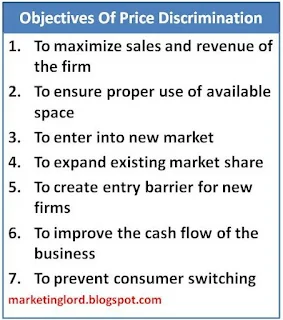Introduction And Meaning Of Price Discrimination
Price discrimination is an act of selling same products or services at
different prices to different customers. It is a pricing strategy where
seller charges different prices to different buyers while selling identical
goods. Different prices may be charged on the basis of age, gender, buying
capacity, geography time etc. The main purpose of price discrimination is to
increase sales and revenue of the company.
Objectives Of Price Discrimination
The main objectives of price discrimination strategy can be pointed out as
follows:
1. To Maximize Sales And Revenue
Business firms charge different price on the basis of paying capacity of
the buyers (higher price to rich and lower price to poor). Therefore, this
pricing strategy helps the firm to maximize sales and generate more
revenue.
2. To Clear Inventory
Firms sell their existing products in discounted price to clear the
inventory to make space for new products. So, it ensures better use of
available space.
3. To Enter Into New Market
Companies practice price discrimination strategy to enter into a new market
or to expand existing market share. Generally, firms charge less price to
attract potential buyers that helps to compete with existing firms in the
market.
Another notable objective of price discrimination is to create entry
barrier to new companies to enter the market. Existing companies use this
strategy to discourage new firms.
Also Read:
5. To Improve Cash Flow
As we know that price discrimination helps to increases sales and revenue
of the firm, that help to maintain balance between cash outflow and inflow.
So, it helps the firm to improve its cash flow.
6. To Discourage Consumer Switching
Because of price discrimination, consumers can be benefited from lower
price that helps to prevent consumer switching (abandon a product). It
increases consumer surplus that helps to retain existing customers.







